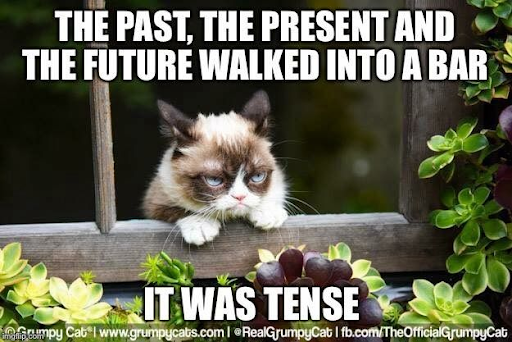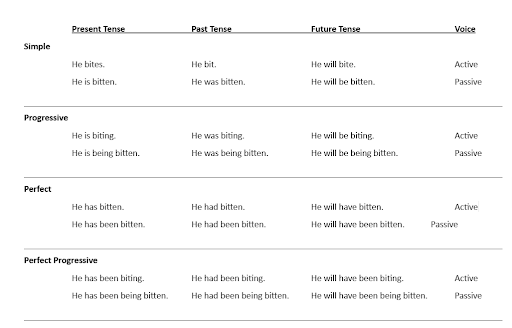
Get ready for a week of Editing Guides! We start with Tense, move into Commas and Semicolons, address Dialogue, cover Weird Punctuation, and end with a discussion of Editing overall.
Tense can mean so many different things, but in writing, it specifically refers to the time frame in which a thing happened. When did the verb actually verb? Did it verb earlier? Past tense. Is it verbing right now? Present tense. Will it verb later? Future tense. Seems pretty simple, right? Except this is English, so of course it is way more complicated than that. Rather than turn this blog into a lesson on traditional English verb tense, which actually includes a mind-boggling 12 tenses (24 if you consider active and passive voice separately!), I’ll focus on what this usually means to authors considering how they want to write their next book.
If you want to hurt your brain learning more about grammar stuff, check out the chart at the bottom of this blog (Yes, you can actually say “He will have been being bitten” and have it actually mean something specific in English–not that anyone wants to say that, or convey the information in that way–but English gives you the option!)
OKay, let’s start with the old standard–past tense. A good chunk of novels and short stories are written in past tense, meaning that the verbs use the past tense ending (-ed, -en, -d). The story would say: Elizabeth Bennet blushed, thinking of how Darcy held her hand as she got in the carriage (Not: Elizabeth Bennet blushes). The story recounts events that have already happened. Benefits of this tense are first that it’s easy to use consistently since we often speak in past tense (and default to it even when we don’t intend to). Past tense is reliable and consistent. One downfall is if you are writing in 1st person, though. A past tense 1st person story means that the narrator survived their ordeal to tell the tale after the fact, so spoiler alert! Do keep in mind that any internal thoughts the characters have are always in present tense, even if the narrative is in past tense (I wonder why Mr. Darcy is such a jerk, Elizabeth thought, frowning as she braided her long hair).
Speaking of present tense, this is becoming more common outside of the romance novels where it reigns supreme. Present tense means that the action is happening in the moment as readers are reading it. Both thoughts and the narrative can be in present tense, but it can get sticky in moments when the narrative recounts a previous event in the moment. For instance, thinking of Lizzie Bennet, we can say this: Elizabeth Bennet blushes, thinking of how Darcy held her hand as she got in the carriage. As is, Lizzie is blushing, thinking of a past event. This is fine in a present tense novel–but that’s not all. You have options! You can have Lizzie think about Darcy in the moment that he touches her hand: Elizabeth Bennet blushes, thinking of Darcy holding her hand as she gets in the carriage OR Elizabeth Bennet blushes, thinking of how Darcy holds her hand as she gets in the carriage. Consider genre expectations when choosing present tense–and doublecheck that you don’t slip back into past tense without cause (like recounting a past event in the present moment).
That leaves future tense, but very little fiction outside of speculative and experimental pieces use this tense to tell a story. When they do, it tends to be very bossy: Elizabeth Bennet will blush, thinking of Darcy will hold her hand when she gets in the carriage. Will she, then? Future tense seems to demand action of the characters, which makes it awkward to maintain for long period of time. It’s like writing in 2nd person (you)–fun for a little while but ultimately challenging to maintain.
When considering tense for your story, think about the genre expectations as well as your own preferences. Going through a novel to change every single verb tense is not a good time, so it’s better to have your tense decided from the start. If in doubt, write the same scene in both tenses and see which one feels better–then maintain that for the rest of the story.
As for me, I will have been being enchanted by Darcy and Lizzie by the time I finish this blog. Yeah, there’s a reason we don’t use passive future perfect progressive tense very often!


